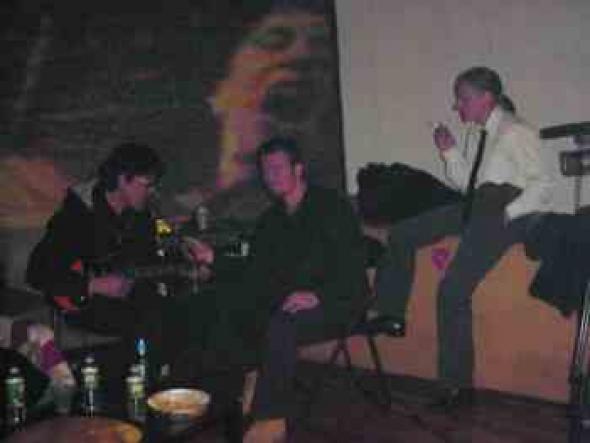Survival Strategies - Digital Style
What now for ‘access’ and ‘autonomy’ after the dot.bomb? Daniel Berchenko reports on current thinking in New York
Nearly everyone can agree that the internet has not lived up to its early utopian promise. What exactly that promise was remains the source of much contention. As it turns out, now may be the perfect time for sober re-evaluation. With the shadow of global recession looming large, the fate of the net as digital marketplace is less than certain. As Name.Space founder and media artist Paul Garrin described the situation during a recent panel discussion: ‘We are in the throes of the hangover of the dot.bomb euphoria.’
For those of you wondering whether that is a good thing, the answer for Garrin seems to be yes. The subject of the discussion was Strategies for Access + Media Autonomy in the Digital Age. It was held on 2 February at the Name.Space Lab in New York as part of the first of a series of events entitled Art Activism + Technology in the Age of Corporate Globalism, presented and organised by new media curator Christine Wang. In addition to Garrin, panelists included John Perry Barlow, retired Wyoming cattle rancher, former lyricist for the Grateful Dead, and co-founder of the Electronic Frontier Foundation, and Saskia Sassen, Professor of Sociology, author and globalisation theorist extraordinaire. Geert Lovink and Eduardo Kac were remote panelists but their participation was limited by technical difficulties, the irony of which was lost on no one.
The discussion was as de-centered as its subject, turning less on ‘strategy’ per se than on what exactly ‘access’ and ‘autonomy’ mean in the context of the new media and whether they are ends in themselves or the means in some larger struggle (or, perhaps, many smaller ones). There was no clear consensus as to whether the political project represented by the internet extends beyond realising the net in some more authentic (i.e. less commercialised) form of its present self or whether the new media have some heretofore undisclosed higher calling. If, as Wang suggested in her opening remarks, the time has come to ‘reclaim the net’ from the tentacles of ‘broadcast hegemony’, who is to reclaim it and what for? In spite of a healthy dose of French critical jargon (a la micropolitics and rhizomes), the American rhetoric of individual liberties seemed to win the day. Garrin and Barlow expressed a shared vision of re-creating the net as a ‘digital commons’ in accordance with Barlow’s dream of ‘an environment where everyone on the planet could say whatever he or she wanted.’ Garrin used the event to launch his most recent venture, The Free Media Foundation – a member-based organisation built on the Pacifica News model, whose purpose is to ‘reclaim public space on the net and preserve free speech, privacy and access for all’ – a noble project by anyone’s standards.
But astute readers will observe that the ideals of autonomy and individual liberties are themselves fundamental to neo-liberalism – the ideological groundwork of the discussion’s somewhat ill-defined bête noire, ‘corporate globalism’. It remains an open question to what extent these values were themselves complicit with the commercialisation of the internet during the course of the last decade. Sassen’s comment that ‘the new media are not just a technical event, they are transformed, shaped and transcribed by the cultures of their users’ was especially apt in this context, though she was not referring specifically to the First World users for whom the net seems to offer nothing more than a medium for free expression, but to those in the Third World who use the new media in their concrete struggles. Sassen was less concerned with realising some earlier vision of the net than with what use the new media could be in their present state. She noted that ‘there is too much talk simply about “access” to technology, there is another kind of work which needs to be done which consists of understanding how the multiplicity of localised efforts and organisations can use the new media.’ Sassen pointed to what she sees as ‘an emergent political architecture that makes it possible for small groups to get connected on their own terms under an agglutinating logic.’ She did not, however, profess to know what sort of larger struggle this architecture might support. Nor did she specifically address the very real concerns of Garrin and Barlow regarding the encroachment of the market on the use of new technologies.
But in spite of the differences among the panelists and the difficulty in clarifying exactly what sort of political project the internet might represent, a sense of cautious optimism pervaded the discussion. Unlike the other .com revolution of the 1990s, theirs had not yet been a failure. Perhaps it had not even begun.
Daniel Berchenko <dberchenko AT hotmail.com> is a writer living in New York
Mute Books Orders
For Mute Books distribution contact Anagram Books
contact@anagrambooks.com
For online purchases visit anagrambooks.com








